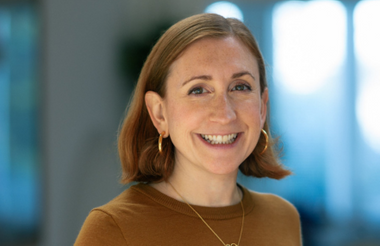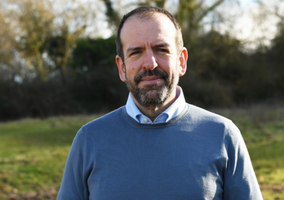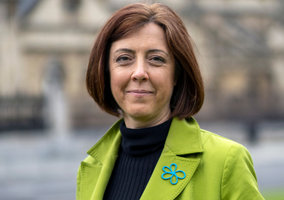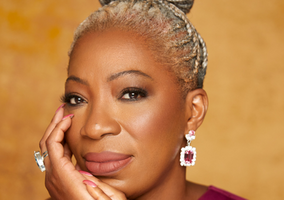Katharine Sacks-Jones decided early on in life that she wanted “to change things” after being inspired by her parents.
“I grew up in a household with parents who were fairly politically active and my dad particularly was really involved in local community action. And through that, I saw the power of people coming together to change things, but I wasn’t really sure how to direct that.”
Sacks-Jones worked for Labour MPs Tessa Jowell and Glenda Jackson for several years but decided she could have more impact outside parliament.
She moved into the charity sector in 2008 and held several policy roles at homelessness charity Crisis before becoming chief executive of women’s charity Agenda in 2015.
Sacks-Jones says she moved to Become, a charity for children in care and care leavers, in 2019 due to her passion for its cause.
“I’ve always worked on issues around social injustice, and social disadvantage particularly, and have been struck by sadly the over representation of people who’ve been in the care system, who haven’t had the support that they’ve needed as children and then have gone on to face problems in adulthood, becoming homeless or with mental health problems.
“When the opportunity with Become came up, and the opportunity to try and do something at an earlier point to try and make sure that children and young people got the support they needed, that was really appealing.
“The other thing that appealed to me about Become was the combination of direct support to young people and using that learning to try and change the system.”
‘A lot of the work charities do is plugging gaps in state support’
Sacks-Jones says the campaigning role that charities play and is vital for changing how the country’s systems work.
“We have to make sure there’s support there for people who need it now, but we also have to try and make the system better for the future, really so that charities aren’t needed in the same way.
“Because a lot of the work that charities and civil society organisations do is plugging gaps in state support systems.”
“I think that's vital when there are those gaps there, and people sadly can find themselves falling through them, but it's a long-term systemic change that's needed.”
Sacks-Jones says charities “have a moral obligation on behalf of the people that they’re there to represent to campaign for change”.
“As charities we see what’s happening on the ground. We hear from people about the systemic failures, and I don’t think it’s enough to just put a sticking plaster on some of these problems.”
Political attention and campaigning
Some in the charity sector have expressed concern about the government and regulators’ attitudes to charities campaigning.
Last week, sector bodies criticised the home secretary’s comments that some charities were “politically motivated activists masquerading as humanitarians”.
Meanwhile, Charity Commission has balanced its support for charities to campaign for their cause while warning them to “avoid inflammatory rhetoric” and not to be “party political”.
In the lead up to a general election, Sacks-Jones says charities have been important in campaigning for big changes to improve society.
“I believe quite strongly that’s a really important role as charities and it’s something certainly at Become that we will continue to do.
“Of course, you need to be mindful that you’re not being party political. But I don’t think charities should be cowered in speaking out. I think we have a role, we have a duty, and I’d like to see charities be more part of the national conversation on some of the big societal challenges that we face, because I think we’ve got a lot to bring to the table.”
Sacks-Jones says her charity faces a challenge to share its message with the wider general public on “just how failing parts of the care system are”.
“It doesn’t get the same kind of political and public attention as other issues do, and that’s something we want to change.
“We speak out in a way that is clear and strong, it is passionate, it is purposeful and it’s evidence based. We talk about the reality happening and we are solutions focused on what needs to change, and I think you can put across your messages really powerfully.
“We’re conscious that we’re not far out from the general election. So we’re really focused on how we make sure that care experienced children and young people’s voices are heard during that.”
Service delivery
Aside from its campaigning work, the charity provides advice and support to young people in care and care leavers.
This includes free coaching, fortnightly online link-ups, education support and running an advice line five days a week.
Sacks-Jones says it can be simpler to convince donors to support Become’s core services than its campaigning work.
“It can be a challenge because it’s easier to get funding for direct delivery of services but I think increasingly people giving are becoming a bit more sophisticated about it and recognising the value of speaking out on the issues and of charities trying to change things.”
Collaboration
Sacks-Jones says the sector could do more to collaborate, and that it must be careful to retain lessons learnt during the Covid-19 pandemic. In particular, she says partnership work on campaigning can be immensely effective.
“There’s something really powerful about the voluntary sector coming together around specific issues.”
“Where missions align, I think it can be really, really powerful, and I definitely think that we could do more of that. Collaborative work is always difficult and slow, but I think it can be really powerful when you get it right.”
“Of all the terrible things that came with Covid, there was also some positives across society, that we were more focused on community and it felt like there was a bit more compassion.”
Sacks-Jones says “sometimes it feels like we’ve forgotten some of those lessons” learnt during the pandemic. “We learned a lot during that period. and I think sometimes we’re quick to forget.”
Embedding young people’s voices
More than half of Become’s trustees are now care experienced, but Sacks-Jones is also looking for other ways for the views of its beneficiaries to be “at the heart of everything” it does.
The charity previously consulted nine young people as part of an advisory board but now takes counsel from a network of 270 young people signed up to its Become the Movement network.
“We’re continually looking at how we can better embed those views and make sure that we hear from a broad range of children and young people.
“When I joined Become, we had advisory groups who were brilliant young people who’d been working with us for a while feeding into influencing work, into strategy.
“But we decided that we wanted to hear from a broader range of young people. So, we took a new approach, which was to create a network of young people.
“The idea is that rather than having one group of young people that we always hear from, we involve different young people in different ways, in ways they want to be involved.
“It could be light touch, it could be more involved but we think that’s really important because certainly it enables us to hear from a broader range of voices.”
Going forward, Sacks-Jones would like the charity to think about how it can embed young people’s voices and “we need to think about how is it we most meaningfully involve young people”.
“I’m interested in trying to think a bit more creatively about different models, and I don’t want us to get into a situation where we do anything that could be tokenistic. I think it’s about having a genuine conversation about how you can share power.”
Creating an inclusive culture
Sacks-Jones says it is important for her charity to understand how different forms of oppression and power dynamics work.
She says the charity has tried to improve its diversity by looking at its recruitment practices.
It has also tried to change how it has conversations internally about racism and oppression and how it trains staff to “make sure we’re creating a culture that's really inclusive and where everyone feels a sense of belonging”.
The charity also focuses on how to respond to issues the young people it works with face “in an intersectional way”.
Sacks-Jones says work in this area can be difficult, and though the charity has made some progress, “we are definitely on a journey, we don’t always get things right, we make mistakes, we have got a long way to go”.
“I’m quite a pragmatic person. I think you’ve got to do that reflection and that learning, you’ve got to take action as well. And sometimes that’ll mean you get things wrong, but we shouldn’t be so scared of getting things wrong we don’t try things.”
‘We have been lucky to be able to grow as a charity’
Become has grown as charity since Sacks-Jones’ arrival, more than doubling its income from 2020 to £1.49m in 2022.
But she says the need for Become’s services is also increasing, with many care leavers struggling with the cost-of-living crisis.
“We have been lucky to be able to grow as a charity over the last few years. Since I’ve joined we have more than doubled, and that’s because we want to be able to do more and to increase our impact.
“The pace of growth that we’ve had is challenging, and the fundraising landscape is increasingly challenging.
“Most of our income still comes from charitable trusts and foundations, but we are growing our relationships with corporate partners and with philanthropists, as well as our community of supporters and givers.”
Sacks-Jones says that despite a challenging operating environment, she is positive about the charity’s future.
“I think I’m an optimist by nature and I think change is possible, I think you have to be in this game. What I hope is that care experienced children and young people’s voices are really listened to. And that the public and government realise that it’s not good enough, the care system in its present state.
“I’d like to see a greater understanding of the care system. I’d like to see policy changes that improve the experiences of children and young people and the investment and political will to back that up.”
Related Articles












